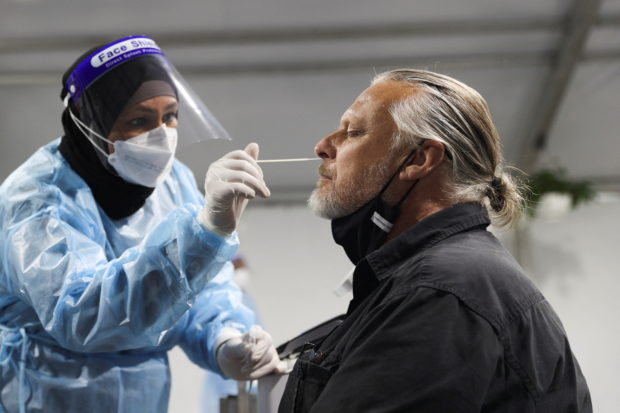
Travellers and flight crew members arrive at the international terminal at Sydney Airport, as countries react to the new coronavirus Omicron variant amid the coronavirus disease (COVID-19) pandemic, in Sydney, Australia, November 30, 2021. REUTERS/Loren Elliott/File Photo
SYDNEY — Australian authorities on Wednesday flagged another probable case of the Omicron variant in Sydney as they braced for more infections after at least two international travelers visited several locations in the city while likely infectious.
Officials in New South Wales (NSW), home to Sydney, said initial testing “strongly indicates” a man in his 40s, who arrived from southern Africa on Nov. 25, had been infected with the Omicron variant and had spent time in the community.
“We believe it is likely it will be confirmed later this afternoon as a definite Omicron case,” NSW Health Minister Brad Hazzard told reporters, but he ruled out lockdowns to contain the newly identified variant.
“I feel like it’s time for a change in approach. We don’t know how many more variants of this virus are going to come,” Hazzard said.
Sydney, Australia’s largest city, came out of nearly four months of lockdown in early October to contain a Delta outbreak and has been gradually easing curbs after higher vaccinations.
When confirmed, the latest probable case would bring the total number of confirmed infections in Australia to seven, with six detected in NSW.
The other person who contracted the Omicron variant is in isolation in the quarantine facility in the remote Northern Territory, from where three people escaped early Wednesday morning, police said. It is not immediately clear if they are infected with COVID-19.
The emergence of the Omicron variant has prompted Australia to pause by two weeks its border reopening plans due from Wednesday to skilled migrants and foreign students. Mandatory two-week quarantine has been enforced for citizens returning from southern African countries.
Authorities on Tuesday confirmed the country’s first community case of the new variant but the national cabinet decided against more restrictions and to wait for more data on its severity and transmissibility.
Strict border controls and quarantine has helped Australia to keep its coronavirus numbers lower than many comparable countries, with around 212,000 cases and 2,012 deaths.